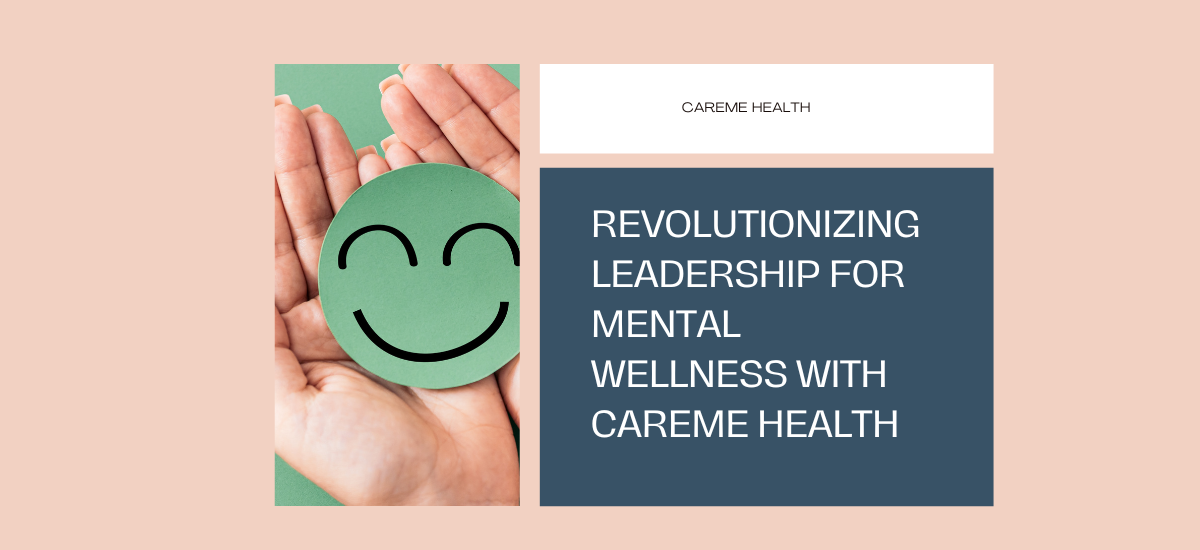Revolutionizing Leadership For Mental Wellness With CAREME HEALTH

The Alarming Trend
In today’s fast-paced corporate environment, an alarming trend is emerging. A significant number of employees are choosing to leave their jobs. The reason isn’t unsatisfactory roles, pay, or work environment, but a desire to distance themselves from their managers. This decision stems from the belief that a breakaway will usher in enhanced personal well-being and mental health.
Transformative Phase Of Leadership
The traditional paradigms of leadership, characterized by authority and control, are evolving. Modern employees seek inspirational leaders who encourage and nurture individuality and mental wellness. Leaders today need to be anchors of empathy, understanding, and support.
Introducing CAREME HEALTH
We are not just another mental health startup; we are a revolution. CareMe Health 🙌 is dedicated to bridging the gap between conventional leadership approaches and the dynamic needs of today’s workforce. We’re rewriting the workplace mental health narrative, one leader at a time.
Key Features of CAREME HEALTH:
- Self-care Tools: Empowering individuals to take charge of their mental health.
- 24/7 Coach Support: Ensuring help is always at hand.
- Immediate Support: Offering instant help during critical moments.
- Psychiatrists and Psychologists: Expert care backed by renowned professionals.
- Community Support: A network of understanding and shared experiences.
- Assessments: Data-driven insights to personalized mental care pathways.
- Mood Trackers: Real-time mood monitoring for tailored interventions.
- Evidence-based Care: Combining science and empathy for holistic care.
The CAREME Difference
In a world where 1 in 5 adults face mental health challenges, the essence of leadership transcends organizational success. CareMe Health 🙌 is your partner, walking alongside your organization, ensuring every step is marked by the mental wellness of your employees.
Ready to transform your organization’s approach to mental health and leadership? Schedule your demo here.
Be The Change
Don’t just adapt to the evolving leadership landscape. Lead the transformation with CareMe Health 🙌 , where every leader is a catalyst for mental wellness.
Related Articles

Letting Go With Grace: Emotional Tools for Closure
Letting go is never easy. Whether we are parting ways with a loved one, ending a relationship, leaving a job, or saying goodbye to a cherished chapter of life, the emotional weight can feel overwhelming. Yet, closure is essential for our emotional well-being. Without it, we carry unresolved grief, anger, regret, or longing that can seep into new relationships and experiences, holding us back from healing and growth.

Breakup Blues: How to Cope and Rebuild Your Self-Worth
A breakup often feels like a silent earthquake—unseen by others but devastating within. The pain doesn’t just come from the loss of a relationship, but from the crumbling of the life, identity, and future you built with another person. You may find yourself questioning your worth, doubting your value, and feeling isolated even when surrounded by people. In Indian society, where emotional expression is often discouraged and breakups can be stigmatized, this pain may feel even more overwhelming. But the truth is—while breakups may shake you, they do not define you. You are not broken; you are in a process of emotional reformation. And with the right tools, guidance, and support system, you can rebuild not just your self-worth but also your entire life narrative.

Healing After Heartbreak: A Mental Health Perspective
Heartbreak doesn't just break your heart—it can shatter your sense of identity, peace, and purpose. Whether the end was expected or abrupt, mutual or one-sided, short-lived or long-term, the aftermath often leaves people emotionally disoriented. In Indian culture, where societal expectations and family involvement in romantic relationships are prevalent, the pain is not just personal—it is public. Yet, very few are taught how to heal from emotional loss in a healthy, sustainable way.

Boundaries in Love: Saying ‘No’ Without Guilt
Love, in its truest form, should be a safe space—a space where individuality is not only respected but celebrated. Yet, in many relationships, especially in the Indian cultural context, love is often misunderstood as constant availability, complete sacrifice, and putting the other person first, always. As noble as this may sound, this version of love often leads to emotional exhaustion, suppressed resentment, and the erosion of one’s identity.

Gaslighting in Relationships: What It Is and How to Heal
Gaslighting is a form of emotional abuse that erodes your ability to trust your own perception. It’s a slow, insidious process that often begins with subtle doubts and ends with complete self-questioning. In romantic relationships—especially in the Indian context where silence, compromise, and duty are often mistaken for love—gaslighting can be even harder to recognize.

How Depression Can Affect Your Relationship—And What You Can Do
Depression is not just an internal struggle—it ripples outward, affecting relationships, routines, and the emotional fabric that holds people together. When someone is dealing with depression, it's not only their world that becomes dim—it can cast a shadow over their most intimate connections too. In a country like India, where open conversations about mental health are still rare and love is often equated with endurance, depression within a relationship can become invisible, misunderstood, or misjudged.
